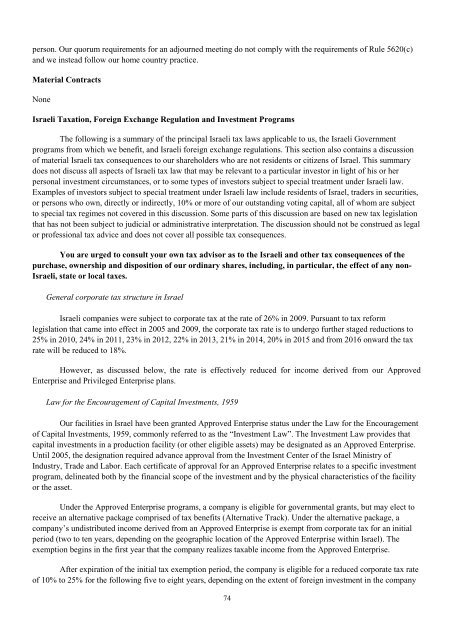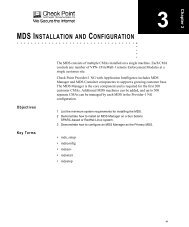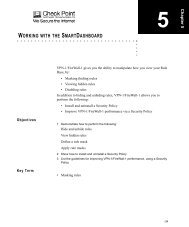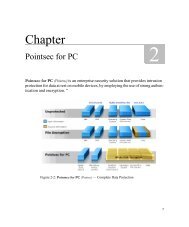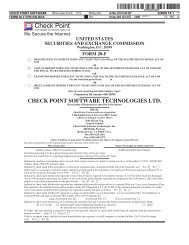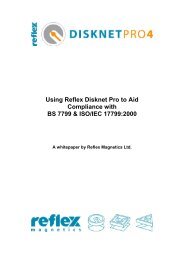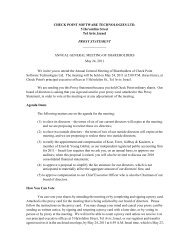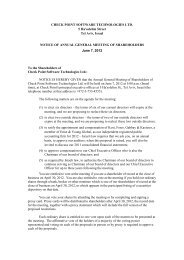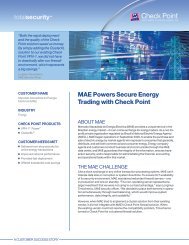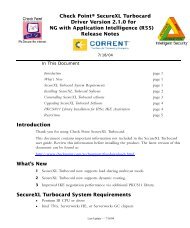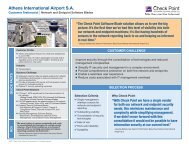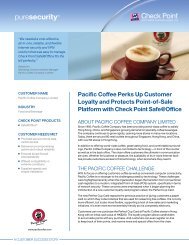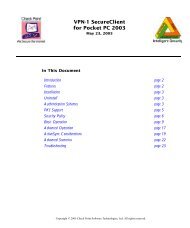FORM 20-F - Check Point
FORM 20-F - Check Point
FORM 20-F - Check Point
Create successful ePaper yourself
Turn your PDF publications into a flip-book with our unique Google optimized e-Paper software.
person. Our quorum requirements for an adjourned meeting do not comply with the requirements of Rule 56<strong>20</strong>(c)<br />
and we instead follow our home country practice.<br />
Material Contracts<br />
None<br />
Israeli Taxation, Foreign Exchange Regulation and Investment Programs<br />
The following is a summary of the principal Israeli tax laws applicable to us, the Israeli Government<br />
programs from which we benefit, and Israeli foreign exchange regulations. This section also contains a discussion<br />
of material Israeli tax consequences to our shareholders who are not residents or citizens of Israel. This summary<br />
does not discuss all aspects of Israeli tax law that may be relevant to a particular investor in light of his or her<br />
personal investment circumstances, or to some types of investors subject to special treatment under Israeli law.<br />
Examples of investors subject to special treatment under Israeli law include residents of Israel, traders in securities,<br />
or persons who own, directly or indirectly, 10% or more of our outstanding voting capital, all of whom are subject<br />
to special tax regimes not covered in this discussion. Some parts of this discussion are based on new tax legislation<br />
that has not been subject to judicial or administrative interpretation. The discussion should not be construed as legal<br />
or professional tax advice and does not cover all possible tax consequences.<br />
You are urged to consult your own tax advisor as to the Israeli and other tax consequences of the<br />
purchase, ownership and disposition of our ordinary shares, including, in particular, the effect of any non-<br />
Israeli, state or local taxes.<br />
General corporate tax structure in Israel<br />
Israeli companies were subject to corporate tax at the rate of 26% in <strong>20</strong>09. Pursuant to tax reform<br />
legislation that came into effect in <strong>20</strong>05 and <strong>20</strong>09, the corporate tax rate is to undergo further staged reductions to<br />
25% in <strong>20</strong>10, 24% in <strong>20</strong>11, 23% in <strong>20</strong>12, 22% in <strong>20</strong>13, 21% in <strong>20</strong>14, <strong>20</strong>% in <strong>20</strong>15 and from <strong>20</strong>16 onward the tax<br />
rate will be reduced to 18%.<br />
However, as discussed below, the rate is effectively reduced for income derived from our Approved<br />
Enterprise and Privileged Enterprise plans.<br />
Law for the Encouragement of Capital Investments, 1959<br />
Our facilities in Israel have been granted Approved Enterprise status under the Law for the Encouragement<br />
of Capital Investments, 1959, commonly referred to as the “Investment Law”. The Investment Law provides that<br />
capital investments in a production facility (or other eligible assets) may be designated as an Approved Enterprise.<br />
Until <strong>20</strong>05, the designation required advance approval from the Investment Center of the Israel Ministry of<br />
Industry, Trade and Labor. Each certificate of approval for an Approved Enterprise relates to a specific investment<br />
program, delineated both by the financial scope of the investment and by the physical characteristics of the facility<br />
or the asset.<br />
Under the Approved Enterprise programs, a company is eligible for governmental grants, but may elect to<br />
receive an alternative package comprised of tax benefits (Alternative Track). Under the alternative package, a<br />
company’s undistributed income derived from an Approved Enterprise is exempt from corporate tax for an initial<br />
period (two to ten years, depending on the geographic location of the Approved Enterprise within Israel). The<br />
exemption begins in the first year that the company realizes taxable income from the Approved Enterprise.<br />
After expiration of the initial tax exemption period, the company is eligible for a reduced corporate tax rate<br />
of 10% to 25% for the following five to eight years, depending on the extent of foreign investment in the company<br />
74


